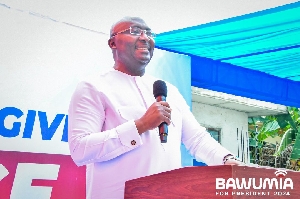Opinions of Tuesday, 4 June 2013
Columnist: Zubeviel, Thomas
Is head teacher autonomy the panacea for ...
....developing functionally literate children?
The acting Dean of the Faculty of Business Administration of the Pentecost University College, Professor Stephen Adei believes that, without adding “one pesewa”, Ghana can “totally change” its inefficient primary school system and produce “functionally literate children” – in one year. According to the learned professor, “the teachers don’t teach, the head teachers do not have authority over them, they do less than 40% contact hours... they do nothing” adding that “all that we have to do is break this GES [Ghana Education Service] monopoly and say from now on the head teacher in the primary school is autonomous. He has the right to discipline, to fire and do what must be done”. In his view, an independent management of basic schools by head teachers is therefore the remedy to the poor standards of education.
While the diagnosis may be grounded in the literature his prescription seem overly simplistic and inordinately optimistic. The problems with basic education are far too complex to be solved by simply giving headteachers the power to “discipline, to fire and do what must be done”. Indeed, headteachers have far more autonomy now than they use to have in the past but the lack of autonomy seem not have been a barrier to high standards of education in those days. Indeed, headteachers have all the rights Prof. Adei wants conferred on them; however, these rights are subject to the usual checks and balances so they are not abused. That apart, many headteachers do not know what to do with this rights or power in their schools.
There is enough evidence to support the assertion that headteacher autonomy drives up their performance; however, without support things can go badly wrong. As a matter of fact, this assertion may be context specific. Media reports about headteachers squandering school resources, failing to register students for final examinations or grappling with inadequate supply of qualified teachers should ring alarm bells in the ears of advocates of headteacher autonomy. Some of these headteachers appeared as ideal leaders, ambitious for their pupils, keen to help the school raise its standards and to do so without the help of the local authority. But, some of these headteachers have had to be asked to repay capitation grants they apparently misappropriated, by their own commissions and omissions. For example, many headteachers in the Upper West Region have had to be surcharged for misappropriating the capitation in 2012 due to poor record keeping, according to SEND Ghana, a Non-governmental Organisation.
It is important to note that the United States of America (USA) and the United Kingdom (UK) have some of the comparatively autonomous headteachers in the world; however the quality of education in these countries fall short of what pertains in Finland – the best education system in the world. What does Finland do differently? One reason is that Finland has the most qualified and motivated teachers at the basic level. The issue is not merely about curriculum content or number of contact hours because Finish students spend lesser hours in school compared to other Organisation for Economic Co-operation and Development (OECD) countries and use curricula modelled along those of the UK and the USA. The comparison of Ghana’s basic education system to that of Rwanda has no terra firma. Even if the Rwandan basic education system were better than Ghana’s, I wonder if these results were achieved in ‘one year’ without a penny.
The plight of some schools in the world is, arguably at least, the result of the drip-drip message that the most successful headteachers are those who relish going it alone. For Michael Gove, it is axiomatic that autonomy drives up performance. Many agree with Professor Adei. Tony Blair, who set up the original academies [Self Managing Schools] in 2000, wrote this year that schools are gaining "pride and purpose" from being in charge of their own destiny, free from "the extraordinarily debilitating and often, in the worst sense, politically correct interference from state or municipality". However, autonomy leads to risks. According to Malcolm Trobe, of the Association of School and College Leaders (ASCL) "the movement towards [autonomy] leaves headteachers significantly more vulnerable than they used to be. If something goes wrong, it is going to come back on the leadership team and on the headteacher. They get isolated and cut off from any support mechanisms they might have had from the local authority."
Encouraging heads to fly solo runs counter to recent moves away from the model of "the heroic leader riding in to save a school on his or her white charger", according to Peter Earley, professor of educational leadership and management at London's Institute of Education. To suggest that headteachers be autonomous and completely independent from the GES is tantamount to a suggestion that power and authority in education should reside in the headteacher rather than distributed or shared within the school and with the local education authority, the governors, fellow heads and other stakeholders. There may be the need to cure some of the inefficiencies within the GES rather than asking headteachers to take charge.
The problem with headteachers at the basic level is that they are not generally trained for leadership positions, their roles are unpredictable and difficult to evaluate, according to Zame and co., and Professor G. T. K Oduro of the University of Cape Coast Institute of Educational Planning and Development. Current reforms require that headteachers at the basic level possess knowledge and skills in procurement, accounting, management, ICT among others which many headteachers in Ghana lack. Too many headteacherss are not good at strategic financial management; it is a weakness the education system is failing to tackle. With more schools running deficit budgets, I can foresee this becoming an increasing problem, though not one that should surprise anyone. Indeed, many headteachers feel "least confident in securing budget and financial accountabilities". Earlier this year in the UK, the Audit Commission urged MPs to tighten up the scrutiny of financial management in schools, a call echoed recently by the National Audit Office, which reported that a quarter of academies[autonomous] schools had needed bail-outs to balance their books.
Taking on schools in challenging circumstances such as those in the rural areas and urban slums is an even riskier business when you add in the government expectation that improvement should be visible quickly. It is not possible to turn a school around in a year let alone an entire educational system without ‘a pesewa’. You can have some initial impact, you can do some patch-ups on exam performance, but to make it sustainable takes time. Headteacher autonomy may not be the answer to the complex and multifaceted issue of developing ‘functionally literate children’ neither is the period of one year enough. Headteachers cannot do it on their own within a year; they need good leadership training themselves, a leadership team and qualified teachers. Increasing headteachers’ pay doesn’t lead to school improvement, it simply makes headteachers richer. People will yearn to be headteachers if there is a lot of money to be received at the end of the month and that is fair enough. After all, they are taking a risk with their career - not to mention those of their staff, pupils and the whole nation.
Thomas Zubeviel tiervella@yahoo.co.uk












